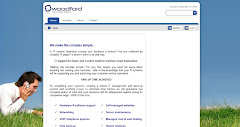 Everyone understands how important it is to back up computerised information, but when was the last time you reviewed your backup systems?
Everyone understands how important it is to back up computerised information, but when was the last time you reviewed your backup systems?If you’ve never had to cope with a major loss of data you should consider yourself lucky, but don’t allow yourself, or your staff, to become complacent. Periodically check that what should happen in theory always happens in practice. Ask a few ‘what if?’ questions. If they reveal any weak spots, find a solution as quickly as possible.
Many small and medium sized businesses are deciding they can’t afford to take even the smallest risk of having valuable data lost, stolen or destroyed. They are choosing the safest option and using secure, off site backup services. Here’s why:
Reliability
When you’re busy, it’s all too easy to forget about backing up your work until after a file has been accidentally deleted or the hard drive has crashed. But an off site storage system automatically copies data directly from your computers to a remote server at pre-arranged times. There’s no need for reminders, and no danger of a single document being overlooked.
Minimising the risk of theft
Once your backups are carefully locked away they are probably safe from all but the most determined thief. But how often is your data transported from one place to another? Do you carry CDs or USB flash drives in your briefcase so you can take work home with you? Do you copy files to a laptop so you have all the information you need when attending meetings out of the office? Have you stopped to think what effect it might have on your business if that briefcase or laptop went missing?
Using an off site backup service eliminates that risk. You simply access whatever you need from your backed up data using any computer with an Internet connection.
Encryption
This is a layer of security that is often underused. If you only encrypt sensitive information when emailing it, you might not think it necessary to encrypt your stored data. That’s fine if you can be certain it will never fall into the wrong hands, but it’s always better to be safe than sorry. With off site backups all your files are encrypted and compressed before leaving your computers. They can then only be recovered by using your account number, password and encryption key.
Disaster proofing
Is the place where you store your backed up data well away from your computers? Is it completely fireproof and waterproof? No matter how careful you are, accidents and malicious damage can happen. Nowhere is completely safe against all eventualities, but a company specialising in off site backups is far more secure than the average office and many store your data in more than one location.
Long-term storage
Tapes, CDs and DVDs don’t last forever and some – even if they are the same age and brand – become corrupted sooner than others. Although data storage technology is improving all the time it makes sense to check your backups regularly to ensure your data is still readable. And you would be well advised to make new copies of your oldest archives: just in case. All this takes time, which could probably be better spent on growing your business. If you use an off site backup service however, your data is protected for as long as you need.







